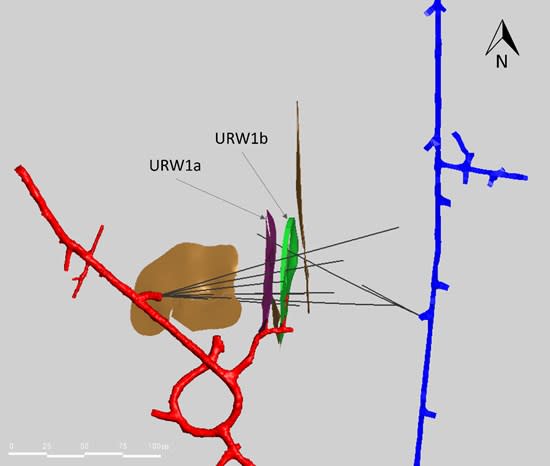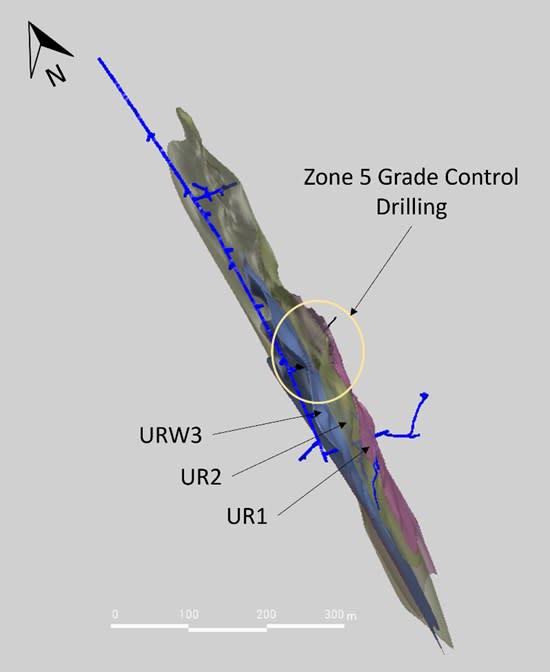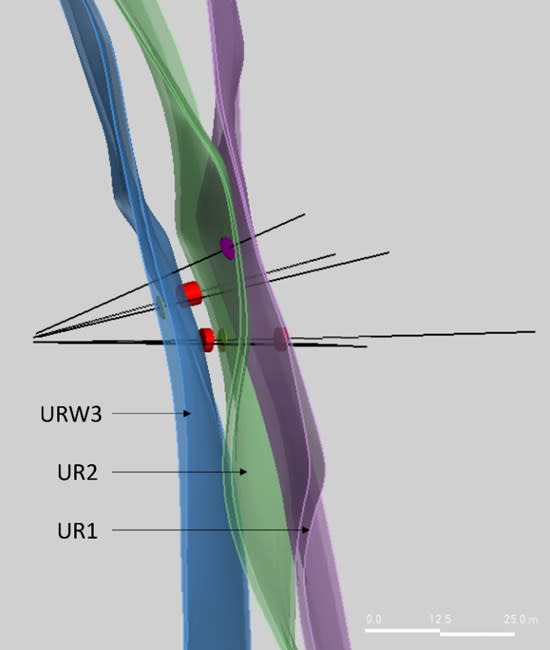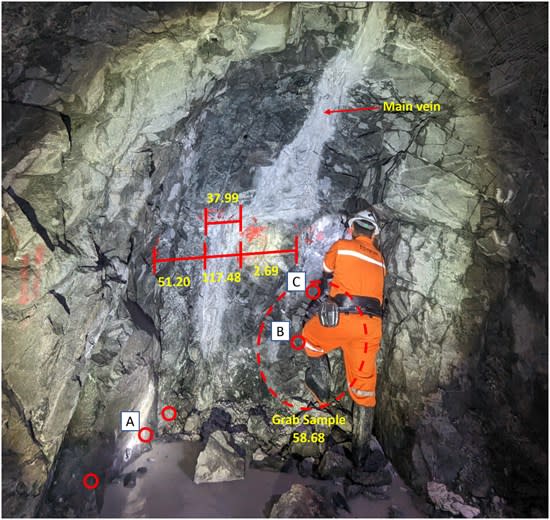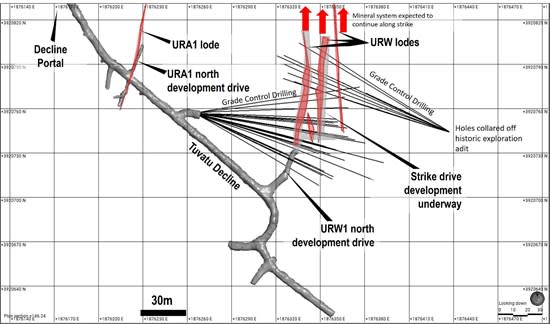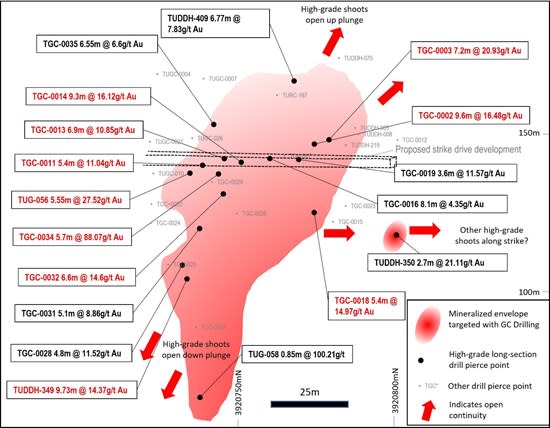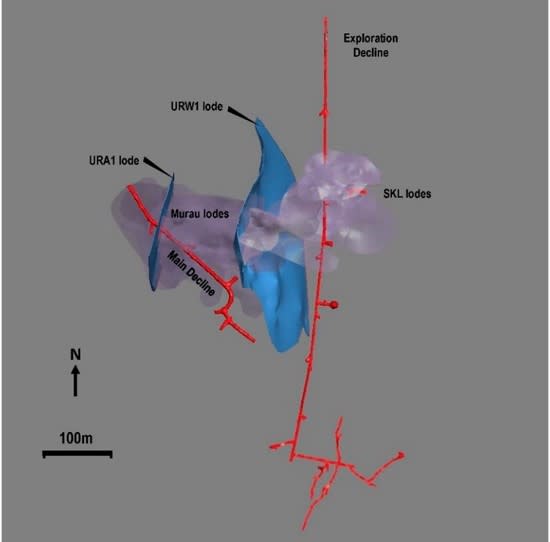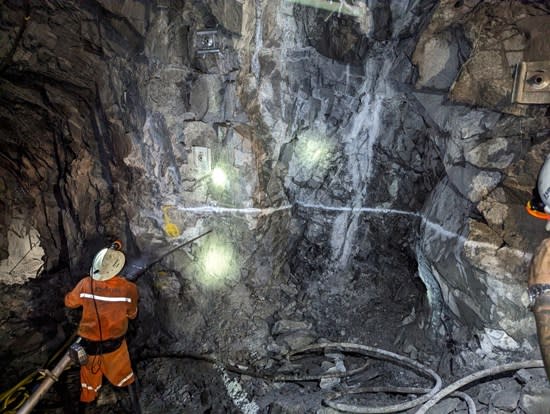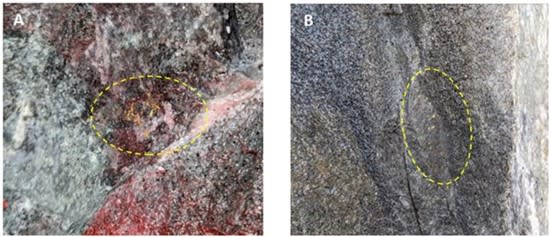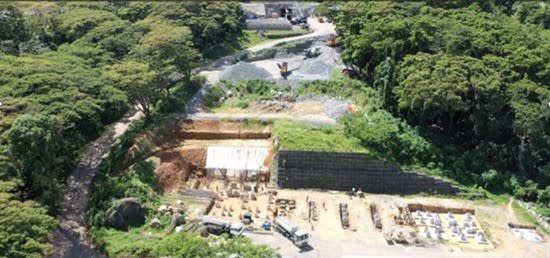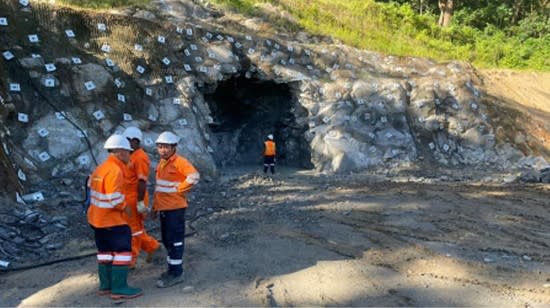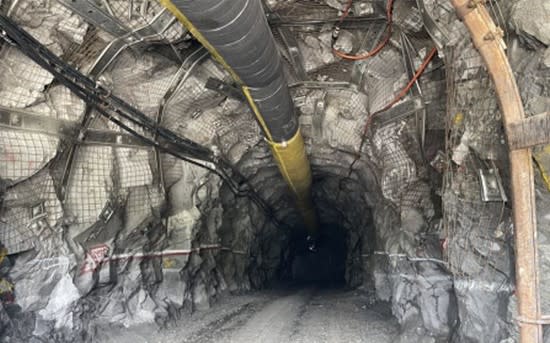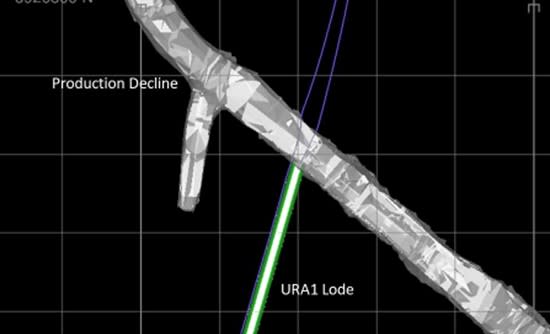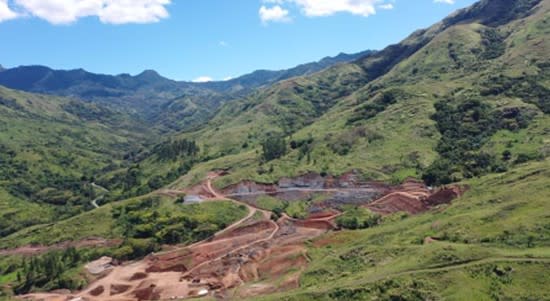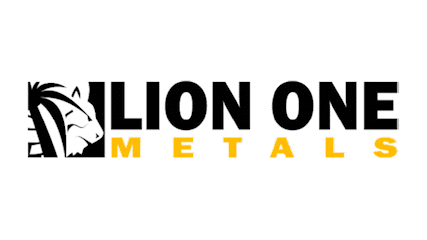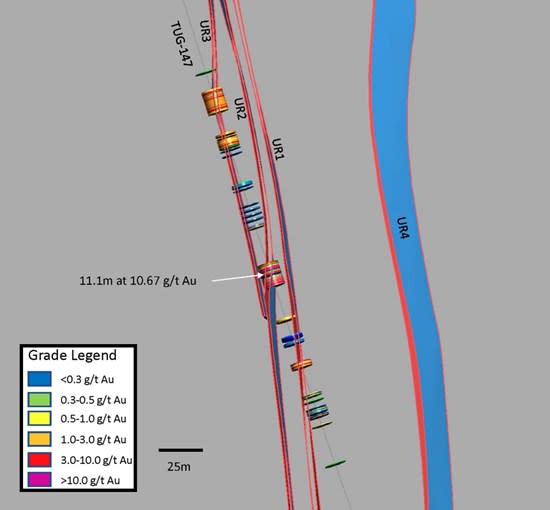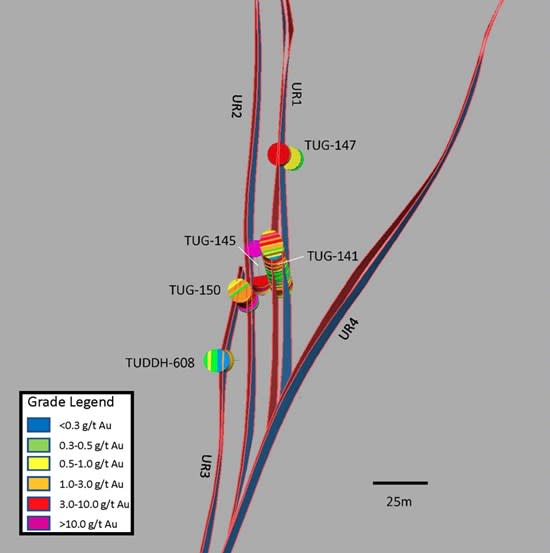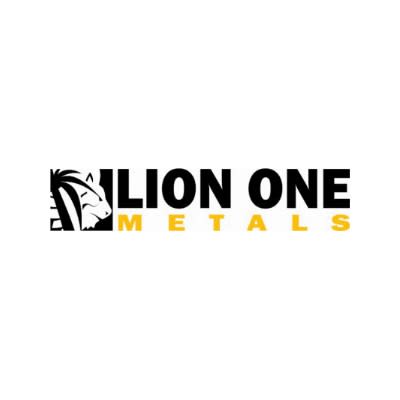Grade Control Drilling in URW1 and Zone 5 Areas Returns Grades over 100 g/t Au
North Vancouver, British Columbia–(Newsfile Corp. – June 14, 2023) – Lion One Metals Limited (TSXV: LIO) (OTCQX: LOMLF) (ASX: LLO) (“Lion One” or the “Company”) is pleased to report significant high-grade gold results from ongoing grade control drilling at its 100% owned Tuvatu Alkaline Gold Project in Fiji.
Assay results are presented here for grade control drilling completed on both the URW1 lode system as well as the Zone 5 area of the deposit, which encompasses the upper portion of lodes UR1, UR2, UR3, UR4, URW2, URW3, URW1A, and UR2A (Figure 1). As reported on May 18, 2023, initial mining of the URW1 lode system has already commenced and grade control drilling is being completed in advance of mining. The Zone 5 area of the deposit is scheduled for mining in early 2024 and thus the grade control drilling in this area is being conducted in anticipation of future mining, as well as to increase the knowledge of the deposit in that area. Additional high-grade intersections peripheral to both the URW1 and the Zone 5 areas are also included in this release as part of the grade control program.
Highlights of new grade control drilling:
- 7.14 g/t Au over 21.6 m (including 18.61 g/t Au over 5.1 m) (TGC-0042, from 73.6 m depth)
- 52.05 g/t Au over 2.1 m (including 345.3 g/t Au over 0.3m) (TGC-0042, from 118.0 m depth)
- 23.11 g/t Au over 3.6 m (including 125.31 g/t Au over 0.3 m) (TGC-0040, from 65.4 m depth)
- 19.43 g/t Au over 3.3 m (including 80.87 g/t Au over 0.6 m) (TGC-0051, from 49.5 m depth)
- 21.15 g/t Au over 2.7 m (including 67.59 g/t Au over 0.6 m) (TGC-0047, from 123.3 m depth)
- 9.39 g/t Au over 4.2 m (including 67.30 g/t Au over 0.3 m) (TGC-0050, from 26.7 m depth)
- 10.13 g/t Au over 3.9 m (including 38.58 g/t Au over 0.6 m) (TGC-0043, from 66.3 m depth)
- 33.99 g/t Au over 0.9 m (including 100.89 g/t Au over 0.3 m) (TGC-0045, from 62.1 m depth)
- 78.03 g/t Au over 0.3 m (TGC-0052, from 40.2 m depth)
Grade control drilling is being conducted on 5-10 m centers and is designed to provide a much higher resolution of the lode arrays than compared to infill drilling, which is being conducted on approximately 20 m centers. This increased resolution provides a much better understanding of the geometry and mineralization of the lodes and helps to optimize mine development and extraction. The grade control drilling program is currently on schedule and the results to date confirm the local understanding of the URW1 and Zone 5 geological models.
Figure 1. Plan View of the Main Tuvatu Deposit with Reported Grade Control Drilling. Plan view image illustrating the location of the most recent grade control drillholes in relation to the Tuvatu lode system. Grade control holes are shown in black, currently modelled mineralized lodes are shown in light grey, the main decline is shown in red, and the historical exploration decline in blue. Previous grade control, infill and exploration drillholes are not shown.
To view an enhanced version of this graphic, please visit:
https://images.newsfilecorp.com/files/2178/169899_3d3cc54d143c3b7b_001full.jpg
URW1 Grade Control Drilling
The URW1 lode system consists of narrow, high-grade to locally bonanza-grade vein arrays and vein swarms that strike approximately N-S and dip sub-vertically to steeply east. Current modelling suggests that there are multiple separate lodes within the URW1 lode system. The first two of these lodes, URW1a and URW1b, are currently being mined. The URW1 lode system has a current strike length of approximately 300 m in the N-S direction, and a vertical extent of approximately 300 m.
A total of 52 grade control holes have been completed to date in the grade control drill program. Results from the first 36 drillholes (TGC-0001 to TGC-0036) were reported on April 25, 2023, and the next 16 drillholes (TGC-0037 to TGC-0052) are reported here. Ten of the most recent grade control drillholes targeted the URW1 area. Figure 2 shows the location of the most recent drillholes in relation to the URW1a and URW1b lodes, as well as to the main Tuvatu decline. Grade control drilling on the URW1 lode system has been conducted from underground from both the main decline and the historical exploration decline, and has been designed to target an 80 m strike section within the overall 300 m strike length of the URW1 system.
Figure 2. Plan View of URW1 Lode System. Plan view image illustrating the location of the most recent grade control holes in relation to the URW1 lode system. The URW1 lode system consists of multiple separate lodes, two of which are highlighted here; URW1a in purple and URW1b in green. The remaining URW1 lodes are shown in brown. The main decline is shown in red, the historical exploration decline in blue, and the grade control drillholes in black.
To view an enhanced version of this graphic, please visit:
https://images.newsfilecorp.com/files/2178/169899_3d3cc54d143c3b7b_002full.jpg
Figure 3. Long Section View of URW1 Lode System. Long section view showing recent high-grade drill intercepts of URW1 with URW1a highlighted in pink and URW1b highlighted in green. All other URW1 lodes are shown in brown. Composite intervals with grades between 3 and 10 g/t Au are shown in yellow, intervals with grades over 10 g/t Au are shown in red. Image is looking north.
To view an enhanced version of this graphic, please visit:
https://images.newsfilecorp.com/files/2178/169899_3d3cc54d143c3b7b_003full.jpg
Figure 4. Example URW1 Drill Core. LEFT: TGC-0040 at 67.3 m depth. Monzonite-hosted stockwork-style veining with a narrow high-grade silica vein containing coarse grained visible gold. RIGHT: TGC-0042 at 91.60 m depth. Vuggy silica vein with narrow bleached alteration halo in monzonite. Width of core is 4.76 cm in each photo.
To view an enhanced version of this graphic, please visit:
https://images.newsfilecorp.com/files/2178/169899_liononefigure4.jpg
Zone 5 Grade Control Drilling
The Zone 5 area of the Tuvatu deposit consists of the upper portion of a series of closely spaced lode systems. The lode systems targeted by the most recent grade control drilling in Zone 5 are the UR1, UR2, and URW3 lodes. These three lodes are located just east of the historical exploration decline, strike approximately N-S, and dip sub-vertically to steeply east, similar to the URW1 lodes. As currently modelled, the UR1, UR2, and URW3 lodes have vertical extents ranging from approximately 700 m to approximately 900 m, and strike lengths ranging from 300 m to 600 m. All three of the lodes are open both along strike and at depth.
A total of six Zone 5 grade control drillholes are included in this report. These are the first six grade control drillholes to target the Zone 5 area and they follow upon the initial results from an ongoing infill drill program in the area. Figure 5 shows the location of these drillholes in relation to the UR1, UR2, and URW3 lodes, as well as to the historical exploration decline. Grade control drilling in the Zone 5 area has been conducted from the historical exploration decline and has been designed to target a 60 m strike section within the overall 300 m to 600 m strike length of these lodes.
Figure 5. Zone 5 Grade Control Drilling in Relation to Targeted Zone 5 Lodes. Image shows the Zone 5 grade control holes in relation to the targeted UR1, UR2, and URW3 lodes. These lodes are slightly concave with URW3 on the inside (left side on image), closest to the exploration decline, and UR1 on the outside. UR1 is shown in pink, UR2 in green, and URW3 in blue. The historical exploration decline is shown in bright blue, and the grade control drillholes are partially visible in black within the circle.
To view an enhanced version of this graphic, please visit:
https://images.newsfilecorp.com/files/2178/169899_3d3cc54d143c3b7b_007full.jpg
Figure 6. Zone 5 Grade Control Intercepts. Section view facing north, showing a 60 m slice of lodes UR1, UR2, and URW3 within Zone 5. Composite intervals with grades between 3 and 10 g/t Au are shown in yellow, while intervals with grades over 10 g/t Au are shown in red and purple.
To view an enhanced version of this graphic, please visit:
https://images.newsfilecorp.com/files/2178/169899_3d3cc54d143c3b7b_008full.jpg
Figure 7. Examples of Zone 5 Drill Core. LEFT: UR2 lode in TGC-0049 at 35.15 m depth. Coarse grained honey sphalerite and pyrite in variable light to dark grey quartz vein with narrow potassic alteration halo. RIGHT: URW3 lode in TGC-0050 at 29.6 m depth. Abundant coarse honey sphalerite rimmed by fine grained sooty pyrite +/- galena and narrow potassic alteration halo, within a larger zone of stockwork style mineralization. Width of core is 4.76 cm in each photo.
To view an enhanced version of this graphic, please visit:
https://images.newsfilecorp.com/files/2178/169899_liononefigure7.jpg
Table 1. Highlights of composited drill results in the URW1 area. Only new grade control drilling results are included here. For previous results see news release from April 25, 2023. For full results see Table 3 in the appendix.
| Hole ID | From | To | Interval (m) | Au (g/t) | |
| TGC-0039 | 77.4 | 78.3 | 0.9 | 8.37 | |
| TGC-0039 | 101.7 | 102.9 | 1.2 | 7.18 | |
| including | 102.3 | 102.6 | 0.3 | 15.64 | |
| TGC-0040 | 30.3 | 31.5 | 1.2 | 4.7 | |
| TGC-0040 | 51.3 | 53.1 | 1.8 | 12.63 | |
| including | 51.9 | 52.5 | 0.6 | 27.05 | |
| TGC-0040 | 65.4 | 69 | 3.6 | 23.1 | |
| including | 66 | 66.3 | 0.3 | 85.87 | |
| and | 67.2 | 67.5 | 0.3 | 125.31 | |
| and | 68.4 | 68.7 | 0.3 | 13.93 | |
| and | 68.7 | 69 | 0.3 | 46.89 | |
| TGC-0040 | 82.5 | 82.8 | 0.3 | 64.65 | |
| TGC-0041 | 16.8 | 19.8 | 3 | 1.52 | |
| TGC-0042 | 47.4 | 51 | 3.6 | 3.96 | |
| including | 50.7 | 51 | 0.3 | 31.99 | |
| TGC-0042 | 52.8 | 54.6 | 1.8 | 11.82 | |
| including | 53.7 | 54 | 0.3 | 64.24 | |
| TGC-0042 | 60 | 63 | 3 | 5.52 | |
| including | 61.8 | 63 | 1.2 | 11.1 | |
| TGC-0042 | 64.5 | 66.6 | 2.1 | 7.19 | |
| including | 64.5 | 65.1 | 0.6 | 17.34 | |
| TGC-0042 | 68.5 | 72.4 | 3.9 | 4.46 | |
| including | 68.5 | 69.7 | 1.2 | 8.25 | |
| TGC-0042 | 73.6 | 95.2 | 21.6 | 7.14 | |
| including | 76.3 | 78.1 | 1.8 | 7.47 | |
| and | 82 | 92.5 | 10.5 | 12.06 | |
| which includes | 83.2 | 83.5 | 0.3 | 19.99 | |
| and | 85.9 | 86.2 | 0.3 | 11.88 | |
| and | 88.6 | 88.9 | 0.3 | 19.92 | |
| and | 89.5 | 90.1 | 0.6 | 15.26 | |
| and | 90.4 | 91.9 | 1.5 | 42.05 | |
| which includes | 90.4 | 91 | 0.6 | 19.98 | |
| and | 91 | 91.3 | 0.3 | 24.93 | |
| and | 91.3 | 91.9 | 0.6 | 72.68 | |
| TGC-0042 | 118 | 120.1 | 2.1 | 52.05 | |
| including | 118.6 | 119.2 | 0.6 | 177.66 | |
| which includes | 118.9 | 119.2 | 0.3 | 345.34 | |
| TGC-0043 | 33.3 | 34.5 | 1.2 | 5.72 | |
| including | 33.3 | 33.6 | 0.3 | 9.15 | |
| TGC-0043 | 66.3 | 70.2 | 3.9 | 10.13 | |
| including | 66.3 | 68.1 | 1.8 | 19.74 | |
| which includes | 66.3 | 66.9 | 0.6 | 38.58 | |
| and | 66.9 | 67.5 | 0.6 | 12.69 | |
| TGC-0044 | 36.6 | 39 | 2.4 | 8.87 | |
| including | 36.6 | 37.5 | 0.9 | 16.81 | |
| TGC-0045 | 62.1 | 63 | 0.9 | 33.99 | |
| including | 62.7 | 63 | 0.3 | 100.89 | |
| TGC-0045 | 75 | 75.6 | 0.6 | 5.94 | |
| including | 75 | 75.3 | 0.3 | 9.3 | |
| TGC-0047 | 100.5 | 101.4 | 0.9 | 23.16 | |
| TGC-0047 | 100.5 | 100.8 | 0.3 | 59.63 | |
| TGC-0047 | 102.6 | 107.7 | 5.1 | 1.54 | |
| TGC-0047 | 123.3 | 126 | 2.7 | 21.14 | |
| including | 124.5 | 126 | 1.5 | 37.08 | |
| which includes | 124.5 | 124.8 | 0.3 | 45.88 | |
| and | 124.8 | 125.4 | 0.6 | 67.59 | |
| TGC-0051 | 16.2 | 19.2 | 3 | 10.15 | |
| including | 16.8 | 17.4 | 0.6 | 19.15 | |
| and | 18 | 18.6 | 0.6 | 16.29 | |
| and | 18.6 | 19.2 | 0.6 | 9.57 | |
| TGC-0051 | 49.5 | 52.8 | 3.3 | 19.43 | |
| including | 49.5 | 50.1 | 0.6 | 8.35 | |
| and | 50.1 | 50.7 | 0.6 | 80.87 | |
| and | 51.9 | 52.8 | 0.9 | 8.69 |
Table 2. Highlights of composited drill results in the Zone 5 area. For full results see Table 4 in the appendix.
| Hole ID | From | To | Interval (m) | Au (g/t) | |
| TGC-0049 | 29.4 | 35.1 | 5.7 | 4.07 | |
| including | 30 | 32.1 | 2.1 | 9.15 | |
| which includes | 30.3 | 30.9 | 0.6 | 16.71 | |
| and | 31.2 | 31.8 | 0.6 | 8.88 | |
| TGC-0049 | 43.3 | 45.1 | 1.8 | 7.59 | |
| including | 43.9 | 44.5 | 0.6 | 16.87 | |
| TGC-0050 | 26.7 | 30.9 | 4.2 | 9.39 | |
| including | 27.6 | 30.6 | 3 | 12.78 | |
| which includes | 27.9 | 29.7 | 1.8 | 18 | |
| which includes | 29.4 | 29.7 | 0.3 | 67.3 | |
| TGC-0052 | 40.2 | 40.5 | 0.3 | 78.03 |
About Tuvatu
The Tuvatu Alkaline Gold Project is located on the island of Viti Levu in Fiji. The January 2018 mineral resource for Tuvatu as disclosed in the technical report “Technical Report and Preliminary Economic Assessment for the Tuvatu Gold Project, Republic of Fiji”, dated September 25, 2020, and prepared by Mining Associates Pty Ltd of Brisbane Qld, comprises 1,007,000 tonnes indicated at 8.50 g/t Au (274,600 oz. Au) and 1,325,000 tonnes inferred at 9.0 g/t Au (384,000 oz. Au) at a cut-off grade of 3.0 g/t Au. The technical report is available on the Lion One website at www.liononemetals.com and on the SEDAR website at www.sedar.com.
Qualified Person
In accordance with National Instrument 43-101 – Standards of Disclosure for Mineral Projects (“NI 43-101”), Sergio Cattalani, P.Geo, Senior Vice President Exploration, is the Qualified Person for the Company and has reviewed and is responsible for the technical and scientific content of this news release.
QAQC Procedures
Lion One adheres to rigorous QAQC procedures above and beyond basic regulatory guidelines in conducting its sampling, drilling, testing, and analyses. The Company utilizes its own fleet of diamond drill rigs, using PQ, HQ and NQ sized drill core rods. Drill core is logged and split by Lion One personnel on site. Samples are delivered to and analyzed at the Company’s geochemical and metallurgical laboratory in Fiji. Duplicates of all samples with grades above 0.5 g/t Au are both re-assayed at Lion One’s lab and delivered to ALS Global Laboratories in Australia (ALS) for check assay determinations. All samples for all high-grade intercepts are sent to ALS for check assays. All samples are pulverized to 85% passing through 75 microns. Gold analysis is carried out using fire assay with an AA finish. Samples that have returned grades greater than 10.00 g/t Au are then re-analyzed by gravimetric method. For samples that return greater than 0.50 g/t Au, repeat fire assay runs are carried out and repeated until a result is obtained that is within 10% of the original fire assay run. Lion One’s laboratory can also assay for a range of 71 other elements through Inductively Coupled Plasma Optical Emission Spectrometry (ICP-OES), but currently focuses on a suite of 9 important pathfinder elements. All duplicate anomalous samples are sent to ALS labs in Townsville QLD and are analyzed by the same methods (Au-AA26, and Au-GRA22 where applicable). ALS also analyses 33 pathfinder elements by HF-HNO3-HClO4 acid digestion, HCl leach and ICP-AES (method ME-ICP61).
About Lion One Metals Limited
Lion One’s flagship asset is 100% owned, fully permitted high grade Tuvatu Alkaline Gold Project, located on the island of Viti Levu in Fiji. Lion One envisions a low-cost high-grade underground gold mining operation at Tuvatu coupled with exciting exploration upside inside its tenements covering the entire Navilawa Caldera, an underexplored yet highly prospective 7km diameter alkaline gold system. Lion One’s CEO Walter Berukoff leads an experienced team of explorers and mine builders and has owned or operated over 20 mines in 7 countries. As the founder and former CEO of Miramar Mines, Northern Orion, and La Mancha Resources, Walter is credited with building over $3 billion of value for shareholders.
On behalf of the Board of Directors of Lion One Metals Limited
“Walter Berukoff“, Chairman and CEO
Contact Investor Relations
Toll Free (North America) Tel: 1-855-805-1250
Email: info@liononemetals.com
Website: www.liononemetals.com
Neither the TSX Venture Exchange nor its Regulation Service Provider accepts responsibility for the adequacy or accuracy of this release
This press release may contain statements that may be deemed to be “forward-looking statements” within the meaning of applicable Canadian securities legislation. All statements, other than statements of historical fact, included herein are forward-looking information. Generally, forward-looking information may be identified by the use of forward-looking terminology such as “plans”, “expects” or “does not expect”, “proposed”, “is expected”, “budget”, “scheduled”, “estimates”, “forecasts”, “intends”, “anticipates” or “does not anticipate”, or “believes”, or variations of such words and phrases, or by the use of words or phrases which state that certain actions, events or results may, could, would, or might occur or be achieved. This forward-looking information reflects Lion One Metals Limited’s current beliefs and is based on information currently available to Lion One Metals Limited and on assumptions Lion One Metals Limited believes are reasonable. These assumptions include, but are not limited to, the actual results of exploration projects being equivalent to or better than estimated results in technical reports, assessment reports, and other geological reports or prior exploration results. Forward-looking information is subject to known and unknown risks, uncertainties and other factors that may cause the actual results, level of activity, performance or achievements of Lion One Metals Limited or its subsidiaries to be materially different from those expressed or implied by such forward-looking information. Such risks and other factors may include, but are not limited to: the stage development of Lion One Metals Limited, general business, economic, competitive, political and social uncertainties; the actual results of current research and development or operational activities; competition; uncertainty as to patent applications and intellectual property rights; product liability and lack of insurance; delay or failure to receive board or regulatory approvals; changes in legislation, including environmental legislation, affecting mining, timing and availability of external financing on acceptable terms; not realizing on the potential benefits of technology; conclusions of economic evaluations; and lack of qualified, skilled labour or loss of key individuals. Although Lion One Metals Limited has attempted to identify important factors that could cause actual results to differ materially from those contained in forward-looking information, there may be other factors that cause results not to be as anticipated, estimated or intended. Accordingly, readers should not place undue reliance on forward-looking information. Lion One Metals Limited does not undertake to update any forward-looking information, except in accordance with applicable securities laws.
Appendix 1: Full Drill Results and Collar Information
Table 3. Composited results from grade control drillholes in the URW1 area (grade >0.5 g/t Au)
| Hole ID | From | To | Interval (m) | Au (g/t) | |
| TGC-0039 | 77.4 | 78.3 | 0.9 | 8.37 | |
| TGC-0039 | 86.1 | 87 | 0.9 | 1.1 | |
| TGC-0039 | 101.7 | 102.9 | 1.2 | 7.18 | |
| TGC-0039 | including | 102.3 | 102.6 | 0.3 | 15.64 |
| TGC-0039 | 106.5 | 107.1 | 0.6 | 0.99 | |
| TGC-0039 | 112.5 | 113.1 | 0.6 | 1.09 | |
| TGC-0039 | 117.3 | 117.6 | 0.3 | 5.86 | |
| TGC-0040 | 10.8 | 12.3 | 1.5 | 2.05 | |
| TGC-0040 | 30.3 | 31.5 | 1.2 | 4.7 | |
| TGC-0040 | 49.8 | 50.1 | 0.3 | 0.85 | |
| TGC-0040 | 51.3 | 53.1 | 1.8 | 12.63 | |
| TGC-0040 | including | 51.9 | 52.5 | 0.6 | 27.05 |
| TGC-0040 | 56.1 | 56.7 | 0.6 | 1.44 | |
| TGC-0040 | 65.4 | 69 | 3.6 | 23.1 | |
| TGC-0040 | including | 66 | 66.3 | 0.3 | 85.87 |
| TGC-0040 | and | 67.2 | 67.5 | 0.3 | 125.31 |
| TGC-0040 | and | 68.4 | 68.7 | 0.3 | 13.93 |
| TGC-0040 | and | 68.7 | 69 | 0.3 | 46.89 |
| TGC-0040 | 82.5 | 82.8 | 0.3 | 64.65 | |
| TGC-0040 | 85.5 | 87 | 1.5 | 2.47 | |
| TGC-0040 | 90.9 | 91.2 | 0.3 | 4.66 | |
| TGC-0041 | 16.8 | 19.8 | 3 | 1.52 | |
| TGC-0041 | 51.9 | 52.8 | 0.9 | 0.82 | |
| TGC-0042 | 24 | 25.2 | 1.2 | 0.92 | |
| TGC-0042 | 39 | 39.6 | 0.6 | 1.94 | |
| TGC-0042 | 47.4 | 51 | 3.6 | 3.96 | |
| TGC-0042 | including | 50.7 | 51 | 0.3 | 31.99 |
| TGC-0042 | 52.8 | 54.6 | 1.8 | 11.82 | |
| TGC-0042 | including | 53.7 | 54 | 0.3 | 64.24 |
| TGC-0042 | 56.1 | 57.3 | 1.2 | 2.32 | |
| TGC-0042 | 60 | 63 | 3 | 5.52 | |
| TGC-0042 | including | 61.8 | 63 | 1.2 | 11.1 |
| TGC-0042 | 64.5 | 66.6 | 2.1 | 7.19 | |
| TGC-0042 | including | 64.5 | 65.1 | 0.6 | 17.34 |
| TGC-0042 | 68.5 | 72.4 | 3.9 | 4.46 | |
| TGC-0042 | including | 68.5 | 69.7 | 1.2 | 8.25 |
| TGC-0042 | 73.6 | 95.2 | 21.6 | 7.14 | |
| TGC-0042 | including | 76.3 | 78.1 | 1.8 | 7.47 |
| TGC-0042 | and | 82 | 92.5 | 10.5 | 12.06 |
| TGC-0042 | which includes | 83.2 | 83.5 | 0.3 | 19.99 |
| TGC-0042 | and | 85.9 | 86.2 | 0.3 | 11.88 |
| TGC-0042 | and | 88.6 | 88.9 | 0.3 | 19.92 |
| TGC-0042 | and | 89.5 | 90.1 | 0.6 | 15.26 |
| TGC-0042 | and | 90.4 | 91.9 | 1.5 | 42.05 |
| TGC-0042 | which includes | 90.4 | 91 | 0.6 | 19.98 |
| TGC-0042 | and | 91 | 91.3 | 0.3 | 24.93 |
| TGC-0042 | and | 91.3 | 91.9 | 0.6 | 72.68 |
| TGC-0042 | 97.6 | 99.7 | 2.1 | 0.96 | |
| TGC-0042 | 110.8 | 112.3 | 1.5 | 2.49 | |
| TGC-0042 | 118 | 120.1 | 2.1 | 52.05 | |
| TGC-0042 | including | 118.6 | 119.2 | 0.6 | 177.66 |
| TGC-0042 | which includes | 118.9 | 119.2 | 0.3 | 345.34 |
| TGC-0042 | 122.5 | 122.8 | 0.3 | 0.61 | |
| TGC-0042 | 124 | 124.6 | 0.6 | 2.88 | |
| TGC-0043 | 33.3 | 34.5 | 1.2 | 5.72 | |
| TGC-0043 | including | 33.3 | 33.6 | 0.3 | 9.15 |
| TGC-0043 | 66.3 | 70.2 | 3.9 | 10.13 | |
| TGC-0043 | including | 66.3 | 68.1 | 1.8 | 19.74 |
| TGC-0043 | which includes | 66.3 | 66.9 | 0.6 | 38.58 |
| TGC-0043 | and | 66.9 | 67.5 | 0.6 | 12.69 |
| TGC-0043 | 84 | 85.5 | 1.5 | 1.02 | |
| TGC-0044 | 1.8 | 2.7 | 0.9 | 2.37 | |
| TGC-0044 | 36.6 | 39 | 2.4 | 8.87 | |
| TGC-0044 | including | 36.6 | 37.5 | 0.9 | 16.81 |
| TGC-0044 | 40 | 40.3 | 0.3 | 1.19 | |
| TGC-0044 | 47.6 | 47.9 | 0.3 | 0.57 | |
| TGC-0044 | 64.4 | 65.3 | 0.9 | 1.3 | |
| TGC-0044 | 74 | 74.6 | 0.6 | 1.02 | |
| TGC-0044 | 76.1 | 76.4 | 0.3 | 0.94 | |
| TGC-0044 | 80 | 80.3 | 0.3 | 0.66 | |
| TGC-0045 | 3.3 | 4.5 | 1.2 | 1.48 | |
| TGC-0045 | 39.3 | 39.6 | 0.3 | 1.2 | |
| TGC-0045 | 44.1 | 44.7 | 0.6 | 1.78 | |
| TGC-0045 | 57.9 | 58.8 | 0.9 | 2.74 | |
| TGC-0045 | 62.1 | 63 | 0.9 | 33.99 | |
| TGC-0045 | including | 62.7 | 63 | 0.3 | 100.89 |
| TGC-0045 | 67.8 | 68.7 | 0.9 | 2.47 | |
| TGC-0045 | 75 | 75.6 | 0.6 | 5.94 | |
| TGC-0045 | including | 75 | 75.3 | 0.3 | 9.3 |
| TGC-0045 | 82.5 | 83.1 | 0.6 | 1.09 | |
| TGC-0045 | 86.1 | 88.5 | 2.4 | 1.33 | |
| TGC-0045 | 93.3 | 94.2 | 0.9 | 2.29 | |
| TGC-0045 | 105.6 | 105.9 | 0.3 | 0.87 | |
| TGC-0047 | 4.8 | 5.4 | 0.6 | 2.55 | |
| TGC-0047 | 41.7 | 44.4 | 2.7 | 1.41 | |
| TGC-0047 | 48.6 | 49.2 | 0.6 | 1.12 | |
| TGC-0047 | 53.1 | 54 | 0.9 | 1.83 | |
| TGC-0047 | 61.5 | 61.8 | 0.3 | 0.67 | |
| TGC-0047 | 69.9 | 70.2 | 0.3 | 2.68 | |
| TGC-0047 | 72.3 | 73.8 | 1.5 | 0.94 | |
| TGC-0047 | 77.7 | 78.6 | 0.9 | 2.71 | |
| TGC-0047 | 81 | 81.9 | 0.9 | 1.44 | |
| TGC-0047 | 84.3 | 84.9 | 0.6 | 0.89 | |
| TGC-0047 | 91.5 | 91.8 | 0.3 | 0.56 | |
| TGC-0047 | 96 | 96.6 | 0.6 | 2.8 | |
| TGC-0047 | 98.4 | 98.7 | 0.3 | 0.61 | |
| TGC-0047 | 100.5 | 101.4 | 0.9 | 23.16 | |
| TGC-0047 | 100.5 | 100.8 | 0.3 | 59.63 | |
| TGC-0047 | 102.6 | 107.7 | 5.1 | 1.54 | |
| TGC-0047 | 110.4 | 111 | 0.6 | 1.08 | |
| TGC-0047 | 113.1 | 114.9 | 1.8 | 0.94 | |
| TGC-0047 | 123.3 | 126 | 2.7 | 21.14 | |
| TGC-0047 | including | 124.5 | 126 | 1.5 | 37.08 |
| TGC-0047 | which includes | 124.5 | 124.8 | 0.3 | 45.88 |
| TGC-0047 | and | 124.8 | 125.4 | 0.6 | 67.59 |
| TGC-0047 | 127.2 | 128.4 | 1.2 | 0.99 | |
| TGC-0047 | 131.7 | 132.3 | 0.6 | 0.54 | |
| TGC-0047 | 134.7 | 138.3 | 3.6 | 1.39 | |
| TGC-0047 | 143.7 | 144.3 | 0.6 | 2.44 | |
| TGC-0051 | 16.2 | 19.2 | 3 | 10.15 | |
| TGC-0051 | including | 16.8 | 17.4 | 0.6 | 19.15 |
| TGC-0051 | and | 18 | 18.6 | 0.6 | 16.29 |
| TGC-0051 | and | 18.6 | 19.2 | 0.6 | 9.57 |
| TGC-0051 | 23.7 | 24.3 | 0.6 | 1.77 | |
| TGC-0051 | 49.5 | 52.8 | 3.3 | 19.43 | |
| TGC-0051 | including | 49.5 | 50.1 | 0.6 | 8.35 |
| TGC-0051 | and | 50.1 | 50.7 | 0.6 | 80.87 |
| TGC-0051 | and | 51.9 | 52.8 | 0.9 | 8.69 |
Table 4. Composited results from grade control drillholes in the Zone 5 area (grade >0.5 g/t Au)
| Hole ID | From | To | Interval (m) | Au (g/t) | |
| TGC-0037 | 24.8 | 27.2 | 2.4 | 0.95 | |
| TGC-0037 | 29.6 | 29.9 | 0.3 | 0.57 | |
| TGC-0037 | 30.5 | 30.8 | 0.3 | 0.56 | |
| TGC-0038 | 27.5 | 27.8 | 0.3 | 0.53 | |
| TGC-0038 | 30.5 | 30.8 | 0.3 | 0.61 | |
| TGC-0046 | 21.2 | 21.5 | 0.3 | 3.33 | |
| TGC-0049 | 29.4 | 35.1 | 5.7 | 4.07 | |
| TGC-0049 | including | 30 | 32.1 | 2.1 | 9.15 |
| TGC-0049 | which includes | 30.3 | 30.9 | 0.6 | 16.71 |
| TGC-0049 | and | 31.2 | 31.8 | 0.6 | 8.88 |
| TGC-0049 | 41.5 | 42.1 | 0.6 | 1.77 | |
| TGC-0049 | 43.3 | 45.1 | 1.8 | 7.59 | |
| TGC-0049 | including | 43.9 | 44.5 | 0.6 | 16.87 |
| TGC-0049 | 47.2 | 47.8 | 0.6 | 0.87 | |
| TGC-0050 | 26.7 | 30.9 | 4.2 | 9.39 | |
| TGC-0050 | including | 27.6 | 30.6 | 3 | 12.78 |
| TGC-0050 | which includes | 27.9 | 29.7 | 1.8 | 18 |
| TGC-0050 | which includes | 27.9 | 28.2 | 0.3 | 10.04 |
| TGC-0050 | and | 28.8 | 29.1 | 0.3 | 12.83 |
| TGC-0050 | and | 29.4 | 29.7 | 0.3 | 67.3 |
| TGC-0050 | 34.5 | 35.7 | 1.2 | 0.83 | |
| TGC-0052 | 27.3 | 28.8 | 1.5 | 0.77 | |
| TGC-0052 | 34.5 | 34.8 | 0.3 | 0.67 | |
| TGC-0052 | 40.2 | 40.5 | 0.3 | 78.03 | |
| TGC-0052 | 50.1 | 50.4 | 0.3 | 1.62 |
Table 5. Collar coordinates and dates of completion for grade control drillholes reported in this release. Coordinates are in Fiji map grid.
| Hole ID | Date Completed | Easting | Northing | Elevation | Azimuth | Dip | DEPTH |
| TGC-0037 | 20-Apr-23 | 1876438 | 3920585 | 117 | 82.5 | -0.5 | 55.4 |
| TGC-0038 | 25-Apr-23 | 1876439 | 3920584 | 117 | 95.2 | 0.0 | 50.0 |
| TGC-0039 | 27-Apr-23 | 1876437 | 3920744 | 139 | 294.2 | 8.0 | 120.1 |
| TGC-0040 | 5-Apr-23 | 1876269 | 3920756 | 153 | 92.3 | -13.0 | 92.3 |
| TGC-0041 | 8-Apr-23 | 1876269 | 3920756 | 152 | 92.1 | -24.5 | 101.7 |
| TGC-0042 | 13-Apr-23 | 1876269 | 3920757 | 153 | 90.4 | 0.0 | 155.2 |
| TGC-0043 | 17-Apr-23 | 1876269 | 3920757 | 153 | 87.1 | -13.4 | 95.6 |
| TGC-0044 | 20-Apr-23 | 1876269 | 3920757 | 154 | 81.4 | 20.0 | 86.0 |
| TGC-0045 | 25-Apr-23 | 1876269 | 3920757 | 153 | 76.4 | 5.3 | 122.1 |
| TGC-0046 | 28-Apr-23 | 1876439 | 3920584 | 118 | 95.4 | 13.6 | 61.7 |
| TGC-0047 | 2-May-23 | 1876269 | 3920757 | 154 | 72.4 | 15.4 | 170.7 |
| TGC-0048 | 8-May-23 | 1876437 | 3920744 | 139 | 296.2 | 2.0 | 42.4 |
| TGC-0049 | 4-May-23 | 1876438 | 3920586 | 117 | 66.6 | 0.5 | 89.5 |
| TGC-0050 | 5-May-23 | 1876438 | 3920586 | 118 | 66.5 | 14.2 | 56.5 |
| TGC-0051 | 10-May-23 | 1876269 | 3920757 | 152 | 87.2 | -26.6 | 125.6 |
| TGC-0052 | 8-May-23 | 1876439 | 3920583 | 118 | 121.1 | 20.4 | 61.2 |
To view the source version of this press release, please visit https://www.newsfilecorp.com/release/169899


